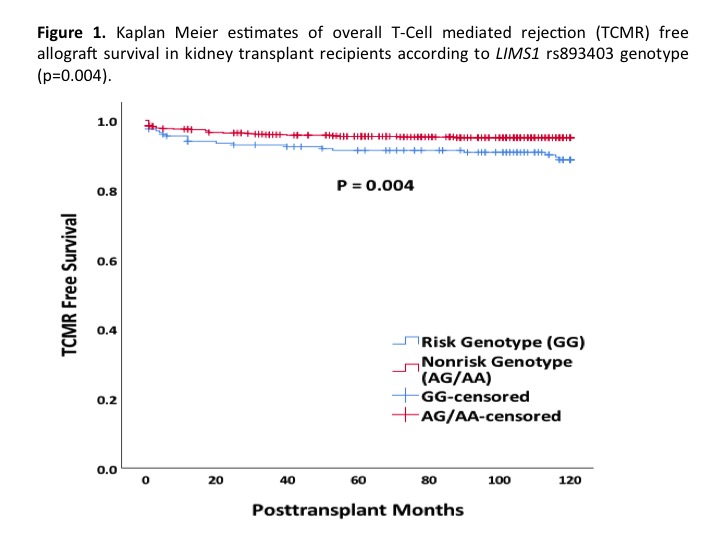Lims1 Gene and Risk of T-Cell Mediated Rejection in Kidney Transplant Recipients
1Division of Nephrology, Saint Louis University, Saint Louis, MO, 2Immunohematology, Leiden University Medical Center, Leiden, Netherlands, 3Division of Nephrology, Istanbul Faculty of Medicine, Istanbul, Turkey, 4Department of Pathology, Istanbul Faculty of Medicine, Istanbul, Turkey, 5Center for Abdominal Transplantation, Saint Louis University, Saint Louis, MO, 6Department of Medical Biology, Istanbul Faculty of Medicine, Istanbul, Turkey
Meeting: 2020 American Transplant Congress
Abstract number: D-062
Keywords: Alloantigens, Kidney transplantation, Rejection
Session Information
Session Name: Poster Session D: Kidney: Acute Cellular Rejection
Session Type: Poster Session
Date: Saturday, May 30, 2020
Session Time: 3:15pm-4:00pm
 Presentation Time: 3:30pm-4:00pm
Presentation Time: 3:30pm-4:00pm
Location: Virtual
*Purpose: Recent advances have provided new insights into the pathogenesis of kidney allograft rejection caused by additional antigens associated with genetic risk variant of LIM Zinc Finger Domain Containing 1 (LIMS1) gene. We aimed to evaluate the association of LIMS1 risk variant of recipients with posttransplant allograft rejection and survival.
*Methods: We genotyped 840 kidney recipients [mean age: 34±12; living donor: 639 (76%)] for LIMS1 rs893403 variant by Sanger sequencing in order to assess their impact on rejections; allograft and patient survivals. All rejections were defined as T-cell (TCMR) or antibody mediated rejection (ABMR) according to Banff 2013 classification We described risk variant in which a recipient who was homozygous for LIMS1 rs893403 GG genotype. Primary outcome was allograft failure and secondary outcomes were biopsy-confirmed TCMR or ABMR.
*Results: There were no significant differences found among patients with rs893403 GG, AG and AA genotypes regarding risk of allograft failure after a median posttransplant follow up of 137 (IQR 104-183) months. The mean eGFR were also similar among recipients with GG, AG and AA genotypes at last follow up. Recipients carrying AA genotype (7.3%) had significantly higher risk of death with functioning graft compared to recipients with GG (2%) and AG (2.5%) genotypes (HR 3.48, 95%CI 1.17-10.35; HR 2.71, 95%CI 1.24-5.93, respectively). Recipients with GG genotype had an approximately 2.15 times higher risk of TCMR than those who did not have this genotype (HR 2.15; 95% CI, 1.23 to 3.74; p=0.007) (Fig 1).
This effect was robust to adjustments for age, sex, donation type, HLA-mismatch status, pre-transplant panel reactive antibodies, donor age and sex, history of transplantation, transfusion, and pregnancy (adjusted HR 2.43; 95% CI, 1.38 to 4.29; p=0.002).
*Conclusions: LIMS1 gene appeared to play role in alloimmunity and particularly in TCMR. These findings may have clinical implications for the prediction and clinical management of kidney transplant rejection by pre-transplant genetic testing of recipients and donors for LIMS1 risk variant.
To cite this abstract in AMA style:
Caliskan Y, Karahan G, Mirioglu S, Ozluk Y, Ouseph R, Yazici H, Randall H, Oguz FSavran, Turkmen A, Sever MS, Lentine K. Lims1 Gene and Risk of T-Cell Mediated Rejection in Kidney Transplant Recipients [abstract]. Am J Transplant. 2020; 20 (suppl 3). https://atcmeetingabstracts.com/abstract/lims1-gene-and-risk-of-t-cell-mediated-rejection-in-kidney-transplant-recipients/. Accessed February 16, 2026.« Back to 2020 American Transplant Congress

